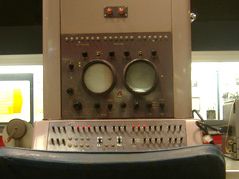British computing: cakes, codes and creativity
Talking tech with the Science Museum's computing curator

It's all too easy to think of the computer as a piece of Americana. With the likes of Microsoft, Apple and IBM clouding our collective cultural memory, it's easy to overlook our small isle and its massive influence on modern computing.
After all, it was British engineers, British inventors and British manufacturers who were very much responsible for inventing the humble PC, from cracking codes at Bletchley Park to counting cakes for Lyons Tea Rooms, the first company to put computers to business use.
So why hasn't Britain stayed at the top of the technological game?
"Most of the early research into computing was done in Britain," Tilly Blyth, Curator of Computing at the British Science Museum, tells us. "And not just building the hardware, Britain had a massive influence conceptually, too. Alan Turing's 1946 paper was absolutely fundamental in exploring the potential for computing.
"But in the UK, we had lots of different industries all looking at computers and creating different kinds of machines; IBM became so huge and had such a large market internally in America that British companies simply couldn't compete."
Still got it
"But don't do us down," she warned. "There are still things we're incredibly well known for, that we do very well in Britain – and are internationally renowned for. ARM, for example, is doing incredible things with processors down in Cambridge.
Get daily insight, inspiration and deals in your inbox
Get the hottest deals available in your inbox plus news, reviews, opinion, analysis and more from the TechRadar team.
"It's just that we don't have those major consumer brands, we don't have any Apples or Microsofts."
The American technology companies are very glamorous; they've got all kinds of gadgets and gizmos packaged up into neat and attractive parcels.
That glamour is something British tech companies seem to lack; engineering and processors are more likely to conjure up images of elbow grease and grime than to come in a svelte box with an Apple logo. Perhaps British computing has an image problem.
"I don't think technology has an image problem in the UK; it's become very cool to be into computing and know your way around a PC. But the problem here is creating the right kind of culture for innovation.
"The Government can help to lead that, but it has to start earlier too; it's about education, learning more than just how to use existing programmes, learning how to think creatively with computing, how to free your imagination."
Freedom and creativity
It's true that computing has become ring-fenced, in a way. Operating systems are easier to use, but the flip side is that more functions are automatically decided for you. Long gone are the days of the Commodore and the Spectrum for which we'd lug about those enormous ring-bound books and write our own programmes as we went.
"I think it's hard these days because computers have come so far – previous generations would only need basic knowledge but with the complexity of computing these days – it can be hard to find a way in to that at a young age," agrees Blyth.
"Maybe the development of apps and web pages can get people interested in technology. The small things can really show what we can achieve with it; perhaps that's the way in.
"And museums, of course. We're there to inspire people and open up ideas and show career paths that might not be immediately obvious.
"For example, our Making Modern Communications gallery is focused on creativity and how users, not just manufacturers and engineers, have helped to mould and shape communications technology. It shows you the influence you personally can have."
Unfortunately, Making Modern Communications won't be finished until around 2014; but it's never too soon to start thinking creatively about technology.
A bit of good old British creativity – and perhaps a nice cup of tea – is just what British tech needs.
Former UK News Editor for TechRadar, it was a perpetual challenge among the TechRadar staff to send Kate (Twitter, Google+) a link to something interesting on the internet that she hasn't already seen. As TechRadar's News Editor (UK), she was constantly on the hunt for top news and intriguing stories to feed your gadget lust. Kate now enjoys life as a renowned music critic – her words can be found in the i Paper, Guardian, GQ, Metro, Evening Standard and Time Out, and she's also the author of 'Amy Winehouse', a biography of the soul star.
Most Popular

